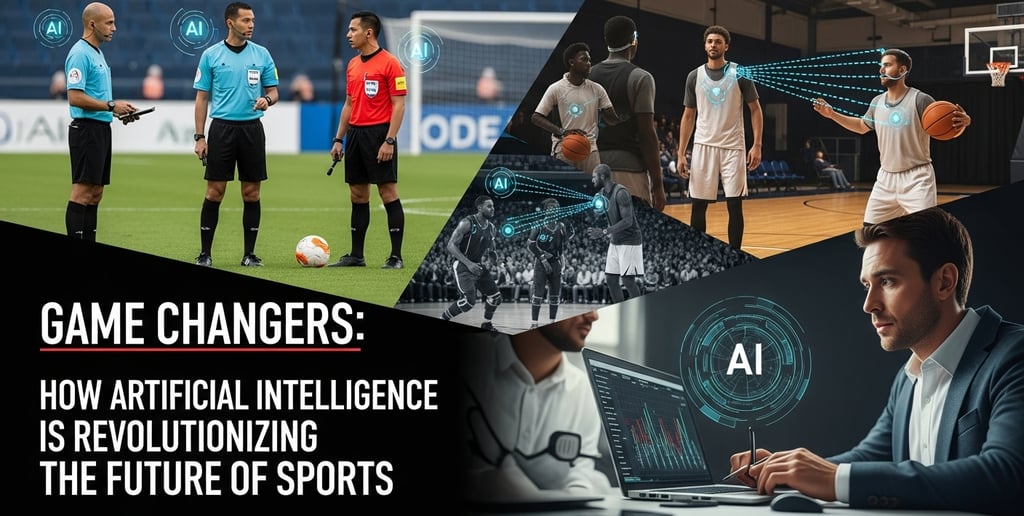Game Changers: How Artificial Intelligence is Revolutionizing the Future of Sports
You know, it's wild to think about how far we've come. Just twenty years ago, if someone told you that computers would be coaching athletes and predicting injuries before they happen, you'd probably think they were living in a fantasy world. But here we are, watching artificial intelligence completely transform the sports we love. From the weekend warrior tracking their morning run to elite athletes preparing for the Olympics, AI has become the invisible teammate that's changing everything.
ARTIFICIAL INTELLIGENCEINNOVATIONTECHNOLOGYSPORTS
Hitanshu Soni
7/13/20255 min read


The AI Revolution on the Field
Let's talk about what's happening behind the scenes. Professional teams aren't just using AI as a fancy add-on anymore – it's become essential to staying competitive. Take the Golden State Warriors, for example. They've got AI systems that are basically like having a super-intelligent assistant coach who never sleeps. These systems watch every practice, every game, monitoring when players are getting tired and suggesting the perfect time to give them a break. It's not just guesswork anymore – it's science.
What really blows my mind is how detailed this gets. In basketball, there are cameras tracking every single player's position 25 times per second. That's more data points than a human brain could ever process, but AI eats it up and spits out insights that would make old-school coaches' heads spin. Soccer teams are doing the same thing, analyzing passing patterns and defensive setups in ways that would have been impossible just a few years ago.
Performance Enhancement Through Data
Here's where things get really personal. Today's athletes are walking around with more technology than astronauts had going to the moon. Those little wearable devices aren't just counting steps – they're collecting data about heart rate, sleep patterns, how hard someone's working out, and even how well they're recovering. The AI takes all this information and basically becomes a personal trainer that knows your body better than you do.
I love seeing how this trickles down to everyday athletes too. Tennis players can now get a sensor for their racket that tells them exactly what they're doing wrong with their swing – in real time. Swimmers have underwater cameras analyzing their strokes, suggesting tiny tweaks that could shave seconds off their times. Even if you're just someone who likes to shoot hoops at the local court, there are apps that can watch you play and give you tips on your form. It's like having a coach in your pocket.
Injury Prevention and Recovery
This is probably the most important part of the whole AI revolution in sports, and honestly, it's where you can see the technology making the biggest difference in people's lives. Instead of waiting for someone to get hurt and then trying to fix them, AI is getting really good at predicting when injuries might happen before they actually do. It's like having a crystal ball, but one that's backed by serious science.
The NFL has been dealing with concussion issues for years, and now they're using AI to study thousands of hits to figure out exactly what causes brain injuries. It's not just about making the game safer – it's about understanding the human body in ways we never could before. The insights are leading to better helmets, new rules, and training methods that actually work.
What's really exciting is how AI is changing recovery too. Instead of boring, repetitive physical therapy sessions, athletes can now use virtual reality systems that adapt to their progress. Imagine playing a game where the difficulty adjusts based on how well your injured knee is healing – that's the kind of stuff that's happening right now.
Fan Experience and Engagement
Let's be real – being a sports fan has never been more fun, and AI deserves a lot of the credit. Remember when you had to wait for highlights on the evening news? Now AI is creating personalized highlight reels that show you exactly what you want to see. If you're a basketball fan who loves three-pointers, the AI knows that and makes sure you never miss a great shot.
The viewing experience itself is getting wild too. Some broadcasts now overlay real-time stats and player information right on your screen, and streaming services are getting scary good at recommending games you'll actually want to watch. Fantasy sports have been completely transformed – instead of just guessing about your lineup, you can get AI-powered insights that actually help you make smarter decisions.
Even going to games is different now. Stadiums are using AI to manage crowds better, so you spend less time in line and more time enjoying the game. Some places are even experimenting with facial recognition and behavior analysis to improve security and customer service, though that's getting into some pretty interesting privacy territory.
The Future of Sports Analytics
The stuff that's coming next is straight out of science fiction, but it's happening right now. Coaches can now run thousands of simulated games to test out new strategies without revealing their game plan to opponents. It's like having a secret laboratory where you can experiment with different plays and see what works before you ever step onto the field.
AI is also helping us understand the perfect way to move in different sports. We're discovering optimal swimming strokes, running gaits, and tennis swings that could completely change how we think about athletic performance. It's not just about being stronger or faster anymore – it's about moving smarter.
Challenges and Considerations
Of course, it's not all smooth sailing. There are some real concerns we need to talk about. When teams are collecting detailed information about athletes' bodies and performance, privacy becomes a huge issue. Who owns that data? What happens to it? These are questions we're still figuring out.
There's also the fairness issue. If some teams have access to cutting-edge AI systems and others don't, is that really fair competition? It's like bringing a smartphone to a calculator fight. The technology gap between big-budget professional teams and smaller programs is getting pretty significant.
And let's not forget about the human element. Sports aren't just about numbers and statistics – there's intuition, emotion, and those magical moments that can't be quantified. Finding the right balance between AI insights and human judgment is something coaches and athletes are still working out.
Looking Ahead
The pace of change is only accelerating, and some of the stuff on the horizon is mind-blowing. We're talking about AI systems that can adjust strategies in real-time during games, virtual reality experiences that let you feel like you're actually playing alongside your favorite athletes, and quantum computing that could take sports analysis to levels we can barely imagine.
What excites me most is how these technologies are becoming more accessible. Pretty soon, your local high school team might have access to the same kind of analysis that professional teams use today. That democratization of AI-powered sports technology could lead to discoveries and improvements at every level of athletic competition.
Conclusion
Looking back at where we've come from and seeing where we're heading, it's clear that artificial intelligence isn't just changing sports – it's revolutionizing the entire experience for everyone involved. Athletes are getting better, fans are more engaged, and we're learning things about human performance that we never knew were possible.
Sure, there are challenges to work through, and we need to make sure we don't lose the heart and soul of what makes sports special. But the potential here is incredible. We're not just talking about making games more entertaining or helping athletes run faster – we're talking about preventing injuries, extending careers, and opening up possibilities for people who might never have had a chance to reach their potential.
The game is definitely changing, and AI is writing the playbook. The question isn't whether this technology will transform sports – it's already happening. The question is how we're going to use it to make sports better for everyone involved.


Hitanshu Soni
Software Developer Engineer at SportVot
